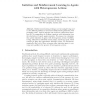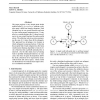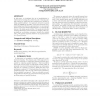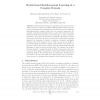458 search results - page 16 / 92 » Q-Decomposition for Reinforcement Learning Agents |
AI
2001
Springer
14 years 5 days ago
2001
Springer
Reinforcement learning techniques are increasingly being used to solve di cult problems in control and combinatorial optimization with promising results. Implicit imitation can acc...
ROBOCUP
2007
Springer
14 years 1 months ago
2007
Springer
This paper describes the design and implementation of robotic agents for the RoboCup Simulation 2D category that learns using a recently proposed Heuristic Reinforcement Learning a...
ICML
2003
IEEE
14 years 8 months ago
2003
IEEE
The paper explores a very simple agent design method called Q-decomposition, wherein a complex agent is built from simpler subagents. Each subagent has its own reward function and...
AAMAS
2007
Springer
13 years 7 months ago
2007
Springer
In this paper, we investigate the use of parallelization in reinforcement learning (RL), with the goal of learning optimal policies for single-agent RL problems more quickly by us...
ROBOCUP
2007
Springer
14 years 1 months ago
2007
Springer
Reinforcement learning is a paradigm under which an agent seeks to improve its policy by making learning updates based on the experiences it gathers through interaction with the en...




